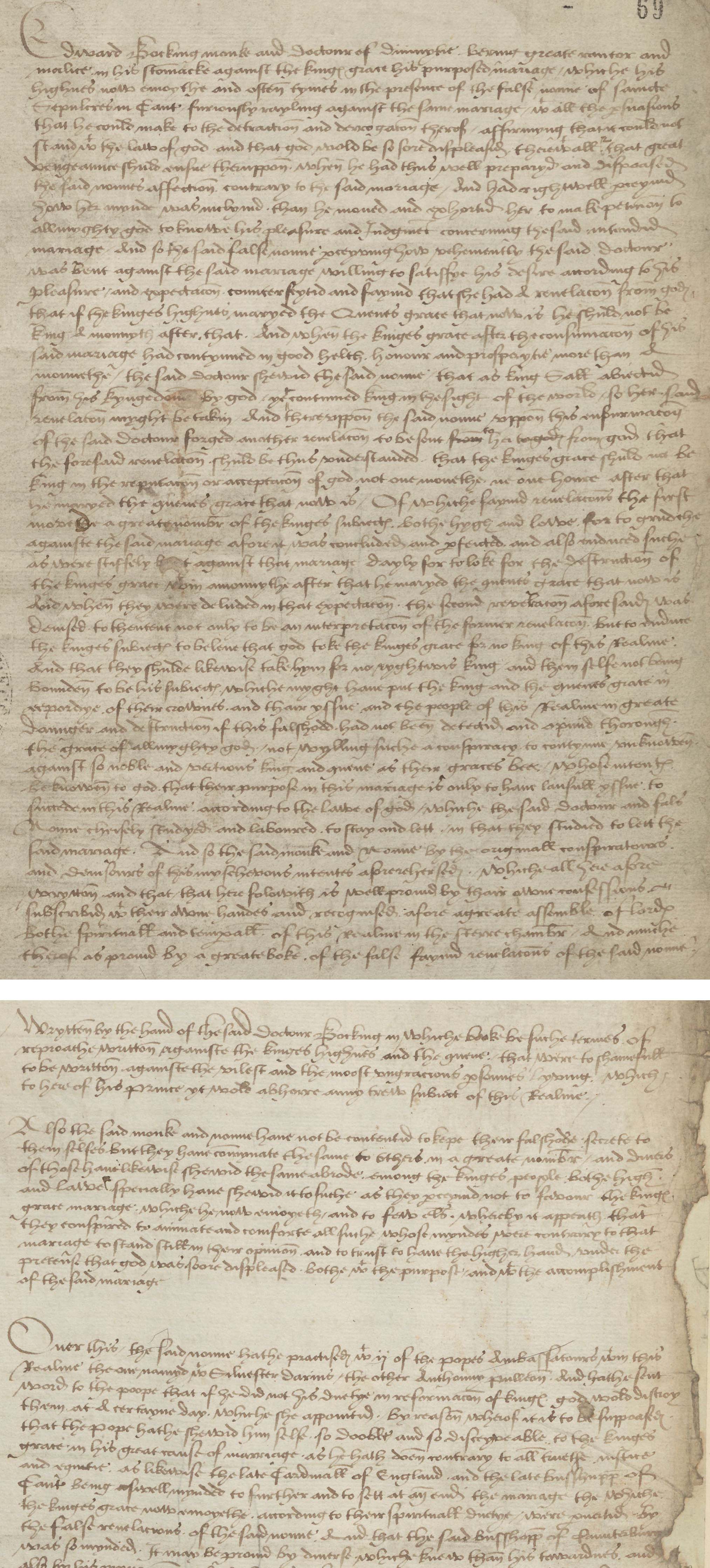
Charges against Dr Bocking and the Nun of Kent, 1534, (SP1/82, f69r-69v)
Elizabeth Barton, the ‘Nun of Kent’, had gained significant support from courtiers and ordinary people before the break with Rome for her prophesies about sinful behaviour. She had even met Henry VIII. However, when she began to speak against Henry VIII’s proposed marriage to Ann Boleyn, she became one of the most important critics of the regime. These extracts of a long account of the charges against Edward Bocking and Barton give some insight into how the state responded to the nun and her supporters, defining her actions, and those of others, in negative ways.
Transcript
[f. 69r]
Edward Bocking monk and doctor of Divinity being … against the king’s grace his purposed marriage … and often times in the presence of the false nun of Saint Sepulchres in Canterbury [Elizabeth Barton, nun of Kent] famously railing against [verbally attacking] the same marriage with all the personages [document damaged] that he could make to the detraction and derogation [repeal of a law] there of affirming that [the marriage did not] stand with the law of god and that god would be so sore displeased therewithal… When he had thus well prepared and disposed the said nun’s affection contrary to the said marriage and had right well perceived that her mind was inclined than he moved and exhorted her to make petition to Almighty god to know his pleasure and Judgment concerning the said intended marriage [to Ann Boleyn]. And so the said false nun perceiving how vehemently the said doctor was bent against the said marriage, willing to satisfy his desire according to his pleasure, and expectation counterfeited and fayned [pretended] that she had a revelation from god that if the kings highness married the Queen graces that now is he should not be king a month after that. And when the kings grace after the confirmation of his said marriage had continued in good health honour and prosperity more than a month the said doctor shewed the said nun that as king Saul abjected [rejected] from his kingdom by god that continued king in the sight of the world, so her said revelation might be taken. And thereupon the said nun upon this information of the said doctor forged [made-up] another revelation to be seen from her to god from god that the foresaid revelation should be thus understood that the king’s grace should not be king in the … expectation of god, not one month nor one hour after he had married the Queen’s grace that now is.. [This fained revelation encouraged] the king’s subjects to believe that god took the king’s grace for no king of this realm. And that they should likewise take him for no righteous king and them self not being bounden to be his subjects which might have put the king and the queen’s grace in jeopardy of their [unclear] and their issue [heirs] and that people of this realm great danger and destruction if this falsehood had not been detected and opened through the grace of Almighty god. Not willing such a conspiracy to continue unknown [document damaged] against so noble and virtuous king and queen as their graces be…
[fo. 69v]
Also the said monk and nun have not been content to keep their falsehood secret to themselves but they have communicated the same to others in a great number and [unclear] of those have likewise shewed the same abroad among the kings people. Both high and low especially have shewed it to such as they perceived not to favour the king’s grace marriage: which he now enjoyed and to few else. Whereby it appeared that they conspired to animate and comfort all such whose minds were contrary to that marriage to stand still in their opinion and to trust to have the higher hand under the pretence that god was sore displeased both with the purpose and with the accomplishment of the said marriage.
Over this, the said nun hath practised with two of the popes Ambassadors within this Realm the one named M. Silvester Darius, the other Anthony Pulleon. And hath sent word to the pope that if he did not his duty in reformation of king’s god would destroy them at a certain day. Which she appointed by reason where of it is to be supposed that the Pope hath shewed himself so doubtful and so deceivable [gullible] to the king’s grace in his great cause of marriage, as he hath [gone] contrary [against] to all truth, justice and equity [fairness]. As likewise, the late Cardinal of England [Wolsey] and the late bishop of Canterbury [William Warham] being as well minded to further and to set it at an end the marriage, the which the king’s grace now enjoyed according to their spiritual duty were persuaded by the false revelations of the said nun. And that the said bishop of Canterbury was so minded [inclined]. It may be proved by diverse [several] which knew that his towardeness [bias] and also by his pronunciation [statement] which he made from the Pope…
